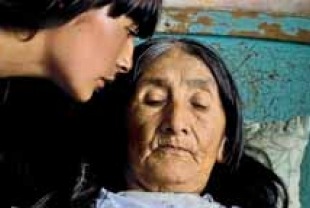During a violent period of extended terrorism in Peruvian history, the Indigenous People suffered mightily: women were raped and men were killed. Years later, in a hovel in the slums of Lima, Fausta (Magaly Solier) watches her mother die. For all of Fausta's life, the old woman has tried to cope with her own rape and humiliation by quietly singing songs about it. Fausta has been told that she has an illness, passed to her through her violated mother's milk — the milk of sorrow.
When her mother dies, Fausta does not have enough money to take her body back to the village of her birth for burial. Her uncle does not want the body at his place since his daughter is about to be married, but he allows it when Fausta lands a job as a maid with a rich musician. However, Fausta cannot walk home alone after work because she is so paralyzed by fear and longing for her mother. Eventually, a kind-hearted gardener volunteers to walk with her, but still she is terrified by all men and the threat she believes they pose to her.
This visually mesmerizing Peruvian film, directed by Claudia Llosa, grapples with a thorny subject: how one frightened and lonely woman deals with the aftershocks of the violence inflicted on her mother and passed on to her. Fausta tries to protect herself by inserting a potato in her vagina as a shield. But the key to her liberation is singing, a truth recognized by her employer who wants to hear her songs in exchange for pearls from a broken necklace. True healing comes through trusting and connecting to others; Fausta attempts this with the gardener. Healing also involves completing her mission to have her mother buried in her own village. The Milk of Sorrow reveals how the toxin of violence lingers painfully in the hearts, minds, bodies, and souls of those who have felt its sting — how this toxin is even passed on to the next generation, bringing more fear, destruction, and paralysis.
